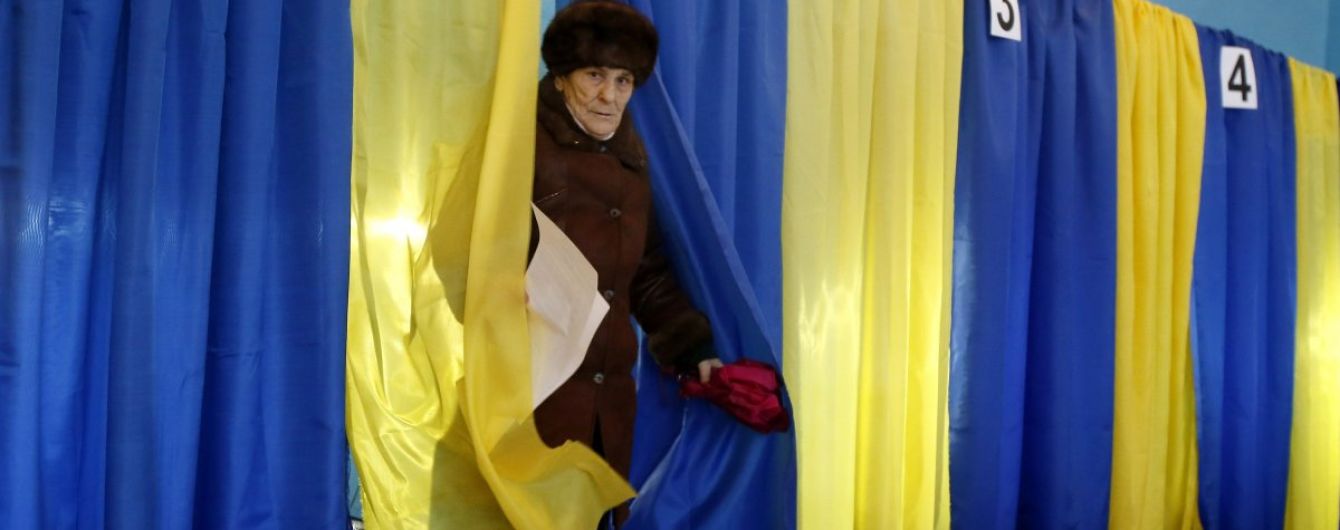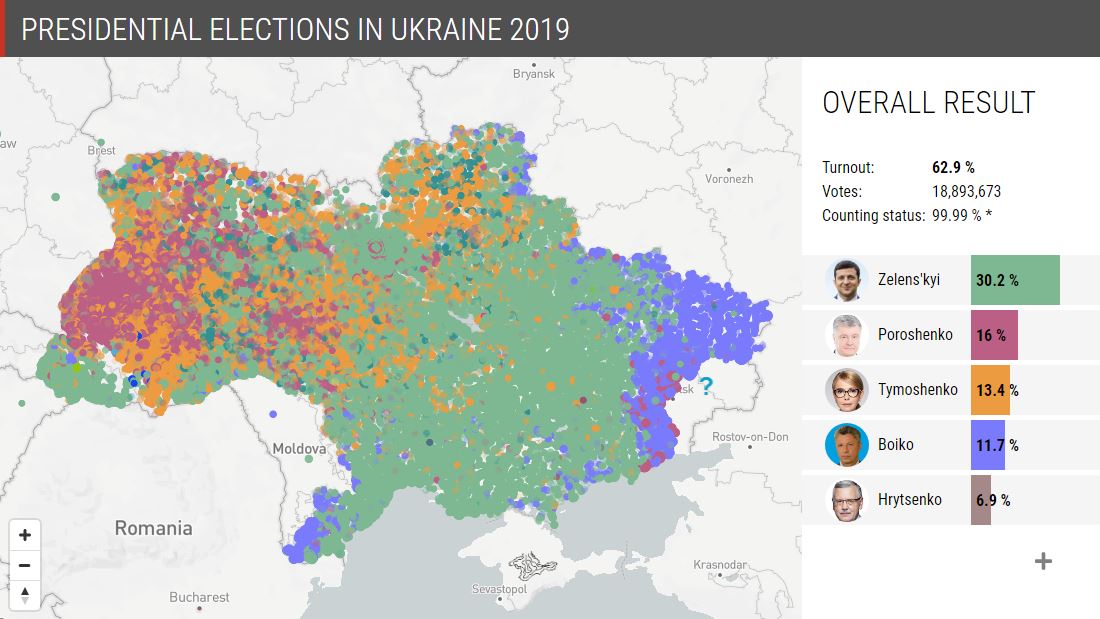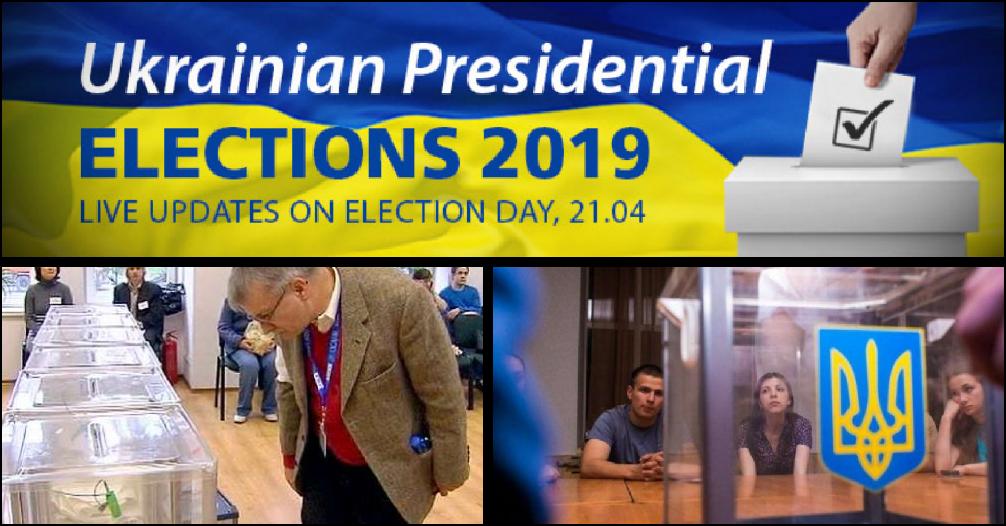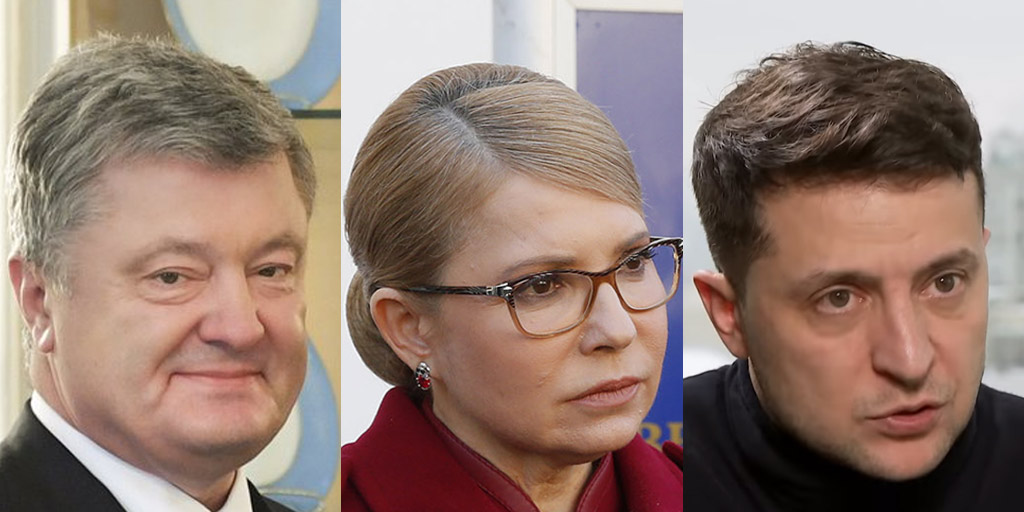
Russian narratives against Poroshenko and a strong desire to delegitimize elections
It’s clear that Russia cares about Ukrainian elections and favors certain candidates. That Putin doesn’t sit well with Poroshenko and his pro-Ukrainian policies was clear from his numerous refusals to talk with Poroshenko, particularly during the conflict in the Black Sea when three Ukrainian ships and 24 hostages were seized. Russian media also denounce Poroshenko, praise Tymoshenko and Zelenskyy as candidates who want to bring peace and economic growth to Ukraine instead of “fascist politicians.”
A noteworthy example is the video of the “Week’s news with Dmitry Kiselyov” aired on Russia’s “Rossiya 24” channel. The fragment concerning Ukrainian elections starts with the following words:
“This year, five years have passed since the bloody сoup d’etat committed by Ukrainian Nazis... And the Kyiv junta started the fratricidal war on Donbas… [Poroshenko] bears the blood of the coup, the blood of civil war, he bears the awful misery which started in Ukraine.”
Then the video shows several “classical” comments about the poverty in Ukraine and portraits Zelenskyy as an alternative anti-oligarch and peace-promising candidate. In the end, the video shows how Zelenskyy is deriding Ukrainian church independence and the Ukrainian church overall in his show.

The idea that Russian President Putin wants to kick out Poroshenko and have an accommodating president in Ukraine was also expressed in the US intelligence report presented on 29 January 2019 by Dan Coats, Director of National Intelligence. According to Yehor Bozhok, the Head of the Service of Foreign Intelligence of Ukraine, the Kremlin provided $350mn for the Russian intelligence to interfere in Ukrainian elections. He says in the interview that “all Russian special services have a clear and specific task for 2019 - ‘to close the Ukrainian question’.”
Recently, pro-Russian candidate Yuriy Boiko (who ranks either as 4th or 5th in the polls) visited Moscow together with Ukrainian oligarch Viktor Medvedchuk. They negotiated with Russian Prime Minister Medvedev regarding Ukraine and told that the Ukrainian economy needs peaceful relations with Russia. This story clearly shows who Russia’s favorite is. Yuriy Boiko also mentioned Yulia Tymoshenko as his political partner while Zelenskyy is strongly promoted by Russian TV as an alternative for Ukraine.

Russia started to spread messages about the alleged illegitimacy of Ukrainian elections after Ukraine decided to close down polling stations in Russia. Russia’s cry to the West was especially loud when the Ukrainian Parliament banned Russian observers from entering Ukraine, which many saw as an absolutely reasonable decision until Russia releases Ukrainian hostages and leaves Crimea and Donbas. Here we cite the words of Russian Prime-Minister Dmitry Medvedev addressed to western audiences:
"Recent events encourage to suspect the worst. The campaign for presidential elections runs with gross violations of generally accepted democratic norms, including the norms of European countries… About three million Ukrainian citizens living and working in Russia have lost the opportunity to vote, which is a clear limitation of the electoral rights of Ukrainian citizens… Citizens of Russia were banned from participating in election observation, even as part of OSCE monitoring missions, which is a serious violation of Ukraine's own international obligations... Obviously, the ruling regime has something to conceal.”
In addition to such statements, Russian media tried to exaggerate the significance of the “National Militia” paramilitary organization which organized radical protests against Poroshenko and wants to observe the upcoming elections. Hacker attacks against the Central election committee were also a part of the Russian plan to undermine the legitimacy of elections, according to Security Service of Ukraine.
- Read also: Do Ukraine’s right-wing extremist groups have a chance of derailing presidential elections?
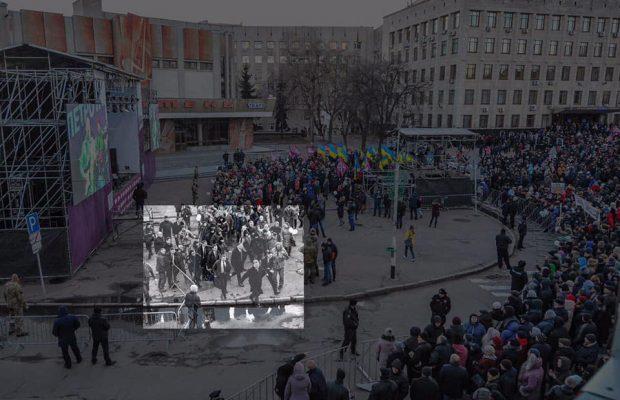
However, such Russian practices to delegitimize Ukrainian elections are mere noise until any serious violations are registered international observation missions in Ukraine. Also, nearly all top candidates all have strong party structures and will control each other on the elections. Only paper protocols signed by observers are legal documents. Any cyber interference may influence the media image of elections and the time needed for calculations, but can’t change the final results.
Proven cases of direct Russian interference: hacker attacks, trolls, propagandists
Hacker attacks on the web-page of the Central Election Committee of Ukraine on 24-25 February are among the examples of Russian attempts to interfere in Ukrainian elections. Ukrainian special services didn’t reveal much information about the accident. Serhiy Demediuk, the head of Ukraine’s cyber police, told in an interview with Reuters that
“the attackers were using virus-infected greeting cards, shopping invitations, offers for software updates and other malicious ‘phishing’ material intended to steal passwords and personal information. Ten weeks before the elections, hackers were also buying personal details of election officials.”
He also worries that such cyber attacks may be a preparation for a larger operation - like shutting down critical infrastructure in sectors such as energy and banking, or the Central Election Committee itself, at the time of elections.
Social networks were also used by Russia for propaganda. On 21 March, the Security Service of Ukraine (SBU) detained 8 persons who were employed by Russia and were disseminating information “of separatist content, aimed at artificially exacerbating the socio-political situation in the region on the eve of and during the presidential elections in the country.”
According to the SBU, the disclosed scheme of propaganda worked in the Russian social network VKontakte. It means that its influence was quite limited since VK was banned in Ukraine already in 2017 and quite quickly substituted by Facebook, losing 2/3 of the Ukrainian audience. Facebook is less accessible for Russian propaganda due to the social network’s policy of blocking fake accounts and trolls.
Regarding the “work” of Russian propagandists in VK, the typical method of Russian special forces was to buy already existing VK groups or create new ones and pay their Ukrainian administrators. The participants of the network received their reward through money transfer services that sanctioned and prohibited in Ukraine - “Zolotaya Korona” ("Golden Crown") and "Webmoney."
Russia also used trolls to spread negative and destructive information in other social networks and web pages, in comments to articles. But this is more a regular Russian activity than a special operation before elections.
Russian propaganda media sources are mostly banned in Ukraine. However, this doesn’t mean that pro-Russian and anti-Ukrainian messages disappeared. As Julia Kazdobina, the Chairman of the Board of the Ukrainian Foundation for Security Studies told, Russia's possibilities to directly influence elections in Ukraine are rather small. At the same time, because Russia has influenced Ukraine for many years, the country has formed a community with pro-Russian views. Some Ukrainian politicians are working on mobilizing this electorate by using the same pressure points as the Russian Federation does. So, despite Russia no longer shaping this community directly, it's still here, and so are its views.
Russian TV channels are banned but oligarchs own all the main channels
|
Sources of political information. The respondents could choose up to two options |
Ukraine in general, % |
|
Central TV channels |
78.6 |
|
Local TV channels |
9.0 |
|
Central printed press (newspapers, magazines) |
6.2 |
|
Local printed press (newspapers, magazines) |
4.7 |
|
Radio |
3.1 |
|
Internet news sites (except social media) |
35.0 |
|
Social media |
9.3 |
|
From friends, relatives, colleagues etc |
11.0 |
Russia indeed talks much about Ukrainian elections on TV-channels but none of them reach Ukraine because of the ban. Kseniya Kirillova, a researcher in the Kyiv Center for Army, Conversion, and Disarmament, even jokes on the activity of Russian TV-channels, writing in her article that:
“The Ukrainian elections are the only possibility for them to feel forgotten intrigue and uncertainty of who will become president; it is the only opportunity to criticize the authorities and discuss the social and economic problems of the country (albeit not their own, but at least the neighboring one).”
- Read more: Russia’s in the midst of an election campaign – it just happens to be in Ukraine, Kirillova says
However, despite direct Russian propaganda being shut down, its indirect influence works in full force through Ukrainian channels. Most Ukrainian TV channels belong to oligarchs who play against Poroshenko and, subsequently, appeal to the pro-Russian or uncertain audience.
The first example in the row is the case of Viktor Medvedchuk, an oligarch called Putin’s number one agent in Ukraine. In June 2018, he bought two important Ukrainian TV channels: NewsOne and 112, and is free to spread pro-Russian messages there.
Dmytro Firtash, another Ukrainian oligarch closely linked to Russia by friendship relations and business in Russia, is the owner of Inter Media Group that controls nine Ukrainian TV channels and disseminates pro-Russian or anti-Ukrainian propaganda. The case of Firtash is exceptionally demonstrative. For three years already, he is a defendant in Vienna court, having been accused of money laundering, and could face extradition either to the USA or Spain, as well as 50 years in prison and confiscation of property. Yet, during this whole period, his TV channels spread the pro-Russian agenda among Ukrainian people.
The other main channels, 1+1 and “Ukraine” (“Ukrayina”), are owned by oligarchs too. Kolomoyskyi, the owner of 1+1, supports or, better to say, employs Zelenskyy. Rinat Ahmetov, the richest person in Ukraine, is the owner of “Ukrayina” channel, which works mainly for the audience of Eastern Ukraine and advocates the policy of peaceful relations with Russia.
Destructive criticism as the main tool of creating uncertainty and distrust
The messages disseminated by Ukrainian oligarchic channels are quite often similar to those in Russia. At the time of the presidential campaign, oligarchic channels tend to exploit the failed-state narrative: “failed government,” “failed reforms,” “ineffective government leading Ukraine to total collapse,” “Poor and starving Ukraine.”
The current government or President are hardly perfect, nor have they implemented all their promises. Yet, when positive changes are totally ignored while a narrative of total betrayal is pushed, the channel can be called propagandistic. And it’s not only about the criticism of Poroshenko, which is normal for a democratic state, but about the overall humiliation of Ukraine as a sufficient sovereign state. The saddest thing is that such TV propaganda spreading total pessimism about Ukraine and advocating for closer ties with Russia even at the cost of sovereignty has a strong influence.
Only during the last year, according to sociological research by KMIS, did a gradual drift towards pro-Russian views take place in Ukraine. A few examples:
- The proportion of those believing that the war was started by separatists and Russia declined from 52% to 48.5%. The share of those who believe that Ukraine began the war rose from 15% from 17%. One in three Ukrainians (35%) "cannot determine their opinion" regarding the question.
- The share of those who believe that Ukrainian-speaking citizens and patriots are persecuted in the Crimea and the Russian puppet republics in eastern Ukraine declined from 43% to 38%. Instead, the share of Ukrainians who believe that ethnic Russians and Russian-speaking citizens are persecuted in Ukraine rose from 10% to 15.5%.
- 51% believe that the one-month introduction of martial law following an open Russian attack on Ukrainian ships in the Black Sea was not due to Russian aggression and played in favor of Ukrainian politicians preparing for the elections.
- 39% of Ukrainians believe that the independence of the Orthodox Church from Moscow was a necessary and an important step towards strengthening the independence of the Ukrainian state while 33% believe that it was a mistake and divided Ukrainians belonging to different denominations.
- 49.5% consider the ban on Russian TV channels to be a mistake (in February 2018, the number was 44%).
Two important conclusions can be made from these results: the pro-Russian opposition in Ukraine perseveres like in the previous 27 years of independence and it may take much more time and efforts to mentally integrate it in sovereign and independent Ukrainian state.
A crucial problem is that the east-west divide is clearly apparent when examining pro-Russian positions. 62% of western Ukrainians believe that Russia started the war in Donbas while only 15% of eastern Ukrainians do.

As Ukrainian intellectual Ivan Dziuba writes, Ukrainians tend to vote “against,” not “for” on these elections. The campaign of all candidates, including far-right and far-left ones, and the agenda of all channels was based on criticism of Poroshenko and the policy of the last 5 years. The irony is that such a campaign not only criticized Poroshenko’s failures but Ukraine as a whole, including the desire for cultural, linguistic and economic autonomy of Ukraine, which definitely requires making efforts and sacrifices. At least, in the beginning.
Read also:
- Live election updates on 31 March will be here
- Do Ukraine’s right-wing extremist groups have a chance of derailing presidential elections?
- Ukraine’s heated presidential campaign most expensive ever
- Two Ukrainian TV channels push Russian propaganda amid presidential election: report
- Three reasons why a comedian should not be president of Ukraine
- Pollsters say Zelenskyy leads in Ukraine’s presidential race. Bookies lean towards Poroshenko
- Oligarchic shadow of Ukraine’s 2019 elections
- In Ukraine, oligarchs set the election agenda using their TV

